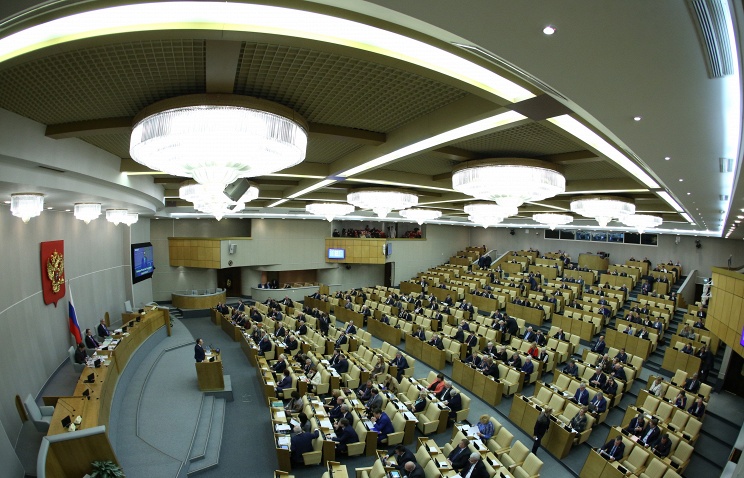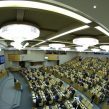
NOT QUITE 100 YEARS OF CURTAILED RUSSIAN PARLIAMENTARISM
Publication: Eurasia Daily Monitor Volume: 3 Issue: 84
By:

Last week both chambers of the Russian parliament gathered for a special session in St. Petersburg to mark the 100th anniversary of the opening of the first State Duma. Tsar Nicholas II had ordered the creation of an arena for political dialogue in a country shaken by the widespread unrest in 1905. Following the tradition set by their 499 predecessors, 407 present-day members of parliament filled the same Catherine Hall in the historic Tauride Palace for a day of self-congratulatory speeches and addresses from neighbors, including the Parliamentary Assembly of the Council of Europe. The praise for the legislative branch of power and its responsiveness to the aspirations of millions of voters was a sharp contrast to the slogan “This Duma is Russia’s shame” that was raised on the roof of the opposite building by a radical group of National–Bolsheviks (Nezavisimaya gazeta, Vremya novostei, April 28).
The speakers preferred to omit the fact that, despite the rather belated launch in 1906, the history of Russian parliamentary practice is far shorter than 100 years, since in January 1918, revolutionary sailors shut down the Constituent Assembly with the legendary statement: “The guards are tired.” The new experiment with a responsive legislature happened only in April 1989, when human-rights advocate Andrei Sakharov addressed the newly elected Congress of People’s Deputies and the country was able to see it live on TV. Even that short history was full of dramatic conflicts and, in fact, the Tsar dissolved the first Duma after only 72 days, calling it “too unruly.” Deputy Prime Minister Alexander Zhukov expressed a considered opinion that the first parliament was “too politicized,” and perhaps the same was true about the Supreme Soviet that was stormed by troops loyal to President Boris Yeltsin after a tank bombardment in October 1993 (Rossiiskaya gazeta, April 28).
Nobody could say anything like that about the legislature that regularly holds its meetings in Gosplan’s former headquarters in downtown Moscow — and nobody is puzzled by the fact that an institution where parties are supposed to settle their scores has not been politicized. The anecdotal statement of Duma’s speaker Boris Gryzlov, “The parliament is not a place for political debates,” rings sadly true. The pro-forma quarrels between extreme nationalist Vladimir Zhirinovsky and the Communists could hardly qualify as meaningful debates, and United Russia, the dominant party of the state bureaucracy sees no need to debate legislative initiatives or direct orders issued by the Kremlin (Le Figaro, April 27). Typically for this tamed parliament, the key moment of the centennial celebration was the evening banquet attended by Russian President Vladimir Putin, who arrived straight from meeting German Chancellor Angela Merkel in Tomsk. Putin praised the “professionalism and responsibility” of the MPs in his toast (Gazeta.ru, April 28).
The presidential administration’s complete and rigid control over the parliament compromises the whole idea of an independent legislative power, so that only 34% of Russians think that a parliament is necessary, while 35% are certain that it is not and 32% have no opinion on the matter (Moskovskie novosti, April 28). At the same time, it reinforces the carefully cultivated idea that the unicentric or “enlightened authoritarian” style of governance is more “organic” to Russia, due to its historic traditions and geographic peculiarities. Most Russians perceive it as entirely natural for Putin to take a marker and draw a new route for a planned pipeline much the same way that Tsar Nicholas I sketched the first railway from Moscow to St. Petersburg (Ekho Moskvy, April 28). The Kremlin’s “political technologists” spare no efforts in spinning the “president-knows-best” message and, since the parliament lacks public respect, they have created more quasi-representative decorations such as the Public Chamber, which recently drew attention with a proposal to forbid state officials from presenting any economic data in dollars (Vedomosti, April 13). Indeed, the only words from the “jubilee” parliamentary session that attracted any public interest was Gryzlov’s confirmation that Putin could be elected president for a third term, but not in 2008 (Newsru.com, April 27).
Efficient as this over-centralized control over the colossal state machinery might seem, a situation in which every decision of any significance can be taken only in one office is fundamentally unhealthy. One part of the problem is the flow of information into this office, since the extra-tight squeeze on the media reduces the availability of alternative opinions; Freedom House has just registered a further step back, with media freedom being all but non-existent in Russia (Lenta.ru, April 29). Another serious deficiency of Putin’s system of power is the apparent lack of any need to rationalize decisions and strengthen them for passage through a system of checks-and-balances, since there are none. Voluntarism, associated with Nikita Khrushchev’s erratic style of leadership, is making a comeback (Ekho Moskvy, April 28). Finally, and most tragically for Putin’s lieutenants, such systems by their very nature cannot have a mechanism for an orderly transfer of power; any successor, however carefully chosen and sworn to loyalty, would have to decimate the old court in order to consolidate his own grasp on power (Grani.ru, April 18).
While Putin’s absolute monopoly over political power in Russia leaves him as the only figure to work with Western counterparts, it also greatly reduces the space for mutual understanding. Fraternizing with the surprisingly popular Merkel in Tomsk, Putin discovered that the only topics available for pleasant conversations are gas and more gas and, well, Siberian cuisine. He has more issues in common with Belarusian president Alexander Lukashenka, who rushed to St. Petersburg after jailing the leaders of the Belarusian opposition, but Putin finds little pleasure in rubbing shoulders with him (Kommersant, April 29). This year Putin has postponed his traditional April address to the parliament, causing speculation as to the reason. Perhaps the idea of dissolving it appears too tempting?




